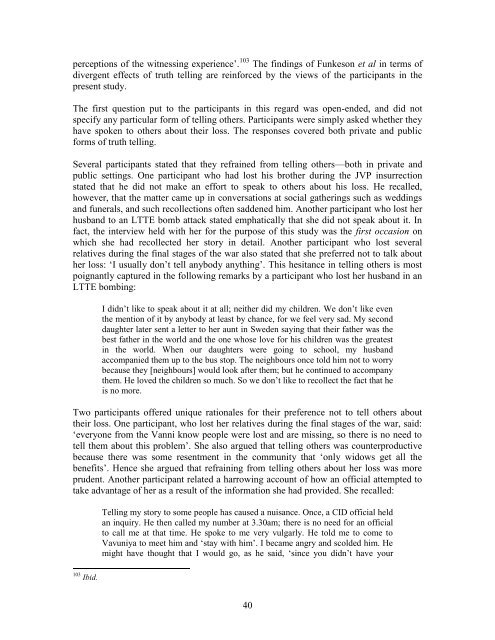Confronting the Complexity of Loss
truth memory justice_final- 11st sep 2015
truth memory justice_final- 11st sep 2015
- No tags were found...
Create successful ePaper yourself
Turn your PDF publications into a flip-book with our unique Google optimized e-Paper software.
perceptions <strong>of</strong> <strong>the</strong> witnessing experience’. 103 The findings <strong>of</strong> Funkeson et al in terms <strong>of</strong><br />
divergent effects <strong>of</strong> truth telling are reinforced by <strong>the</strong> views <strong>of</strong> <strong>the</strong> participants in <strong>the</strong><br />
present study.<br />
The first question put to <strong>the</strong> participants in this regard was open-ended, and did not<br />
specify any particular form <strong>of</strong> telling o<strong>the</strong>rs. Participants were simply asked whe<strong>the</strong>r <strong>the</strong>y<br />
have spoken to o<strong>the</strong>rs about <strong>the</strong>ir loss. The responses covered both private and public<br />
forms <strong>of</strong> truth telling.<br />
Several participants stated that <strong>the</strong>y refrained from telling o<strong>the</strong>rs—both in private and<br />
public settings. One participant who had lost his bro<strong>the</strong>r during <strong>the</strong> JVP insurrection<br />
stated that he did not make an effort to speak to o<strong>the</strong>rs about his loss. He recalled,<br />
however, that <strong>the</strong> matter came up in conversations at social ga<strong>the</strong>rings such as weddings<br />
and funerals, and such recollections <strong>of</strong>ten saddened him. Ano<strong>the</strong>r participant who lost her<br />
husband to an LTTE bomb attack stated emphatically that she did not speak about it. In<br />
fact, <strong>the</strong> interview held with her for <strong>the</strong> purpose <strong>of</strong> this study was <strong>the</strong> first occasion on<br />
which she had recollected her story in detail. Ano<strong>the</strong>r participant who lost several<br />
relatives during <strong>the</strong> final stages <strong>of</strong> <strong>the</strong> war also stated that she preferred not to talk about<br />
her loss: ‘I usually don’t tell anybody anything’. This hesitance in telling o<strong>the</strong>rs is most<br />
poignantly captured in <strong>the</strong> following remarks by a participant who lost her husband in an<br />
LTTE bombing:<br />
I didn’t like to speak about it at all; nei<strong>the</strong>r did my children. We don’t like even<br />
<strong>the</strong> mention <strong>of</strong> it by anybody at least by chance, for we feel very sad. My second<br />
daughter later sent a letter to her aunt in Sweden saying that <strong>the</strong>ir fa<strong>the</strong>r was <strong>the</strong><br />
best fa<strong>the</strong>r in <strong>the</strong> world and <strong>the</strong> one whose love for his children was <strong>the</strong> greatest<br />
in <strong>the</strong> world. When our daughters were going to school, my husband<br />
accompanied <strong>the</strong>m up to <strong>the</strong> bus stop. The neighbours once told him not to worry<br />
because <strong>the</strong>y [neighbours] would look after <strong>the</strong>m; but he continued to accompany<br />
<strong>the</strong>m. He loved <strong>the</strong> children so much. So we don’t like to recollect <strong>the</strong> fact that he<br />
is no more.<br />
Two participants <strong>of</strong>fered unique rationales for <strong>the</strong>ir preference not to tell o<strong>the</strong>rs about<br />
<strong>the</strong>ir loss. One participant, who lost her relatives during <strong>the</strong> final stages <strong>of</strong> <strong>the</strong> war, said:<br />
‘everyone from <strong>the</strong> Vanni know people were lost and are missing, so <strong>the</strong>re is no need to<br />
tell <strong>the</strong>m about this problem’. She also argued that telling o<strong>the</strong>rs was counterproductive<br />
because <strong>the</strong>re was some resentment in <strong>the</strong> community that ‘only widows get all <strong>the</strong><br />
benefits’. Hence she argued that refraining from telling o<strong>the</strong>rs about her loss was more<br />
prudent. Ano<strong>the</strong>r participant related a harrowing account <strong>of</strong> how an <strong>of</strong>ficial attempted to<br />
take advantage <strong>of</strong> her as a result <strong>of</strong> <strong>the</strong> information she had provided. She recalled:<br />
Telling my story to some people has caused a nuisance. Once, a CID <strong>of</strong>ficial held<br />
an inquiry. He <strong>the</strong>n called my number at 3.30am; <strong>the</strong>re is no need for an <strong>of</strong>ficial<br />
to call me at that time. He spoke to me very vulgarly. He told me to come to<br />
Vavuniya to meet him and ‘stay with him’. I became angry and scolded him. He<br />
might have thought that I would go, as he said, ‘since you didn’t have your<br />
103 Ibid.<br />
40



